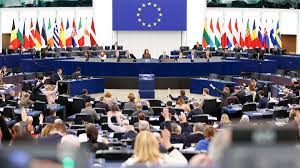‘Anti-European’ populists on track for big gains in EU elections, says report

Brussels: Populist “anti-European” parties are heading for big gains in June’s European elections that could shift the parliament’s balance sharply to the right and jeopardise key pillars of the EU’s agenda including climate action, polling suggests.
Polling in all 27 EU member states, combined with modelling of how national parties performed in past European parliament elections, shows radical right parties are on course to finish first in nine countries including Austria, France and Poland.
Projected second- or third-place finishes in another nine countries, including Germany, Spain, Portugal and Sweden, could for the first time produce a majority rightwing coalition in the parliament of Christian Democrats, conservatives and radical right MEPs.

The analysis should “serve as a wake-up call for European policymakers about what is at stake” in the election, said the political scientists Simon Hix and Kevin Cunningham, who co-authored the report for the European Council on Foreign Relations (ECFR).
The researchers said the implications of the vote were far-reaching, arguing the next European parliament could block laws on Europe’s green deal and take a harder line on other areas of EU sovereignty including migration, enlargement and support for Ukraine.
Domestic debates could also be affected, they said, bolstering the “growing axis of governments trying to limit the EU’s influence from within”: Hungary, Italy, Slovakia, Sweden and, if Geert Wilders’ PVV heads its new government, the Netherlands.
The possible return of Donald Trump in the US and a right-leaning, inward-focused coalition in the European parliament could result in a rejection of “strategic interdependence and … international partnerships in defence of European interests and values”, they warned.
The projections showed the mainstream political groups in the parliament – the centre-right European People’s party (EPP), centre-left Socialists and Democrats (S&D), the centrist Renew Europe (RE) and Greens (G/EFA) – all losing MEPs.
The more radical Left group and particularly the populist right, including the European Conservatives and Reformists Group (ECR) and far-right Identity and Democracy (ID), are set to emerge as the main victors, with a real possibility of entering a majority coalition for the first time.
Although the EPP looks likely to remain the largest group, retain its agenda-setting power and determine the choice of the next Commission president, the report argues that populists, particularly from the radical right, will have a greater say than ever before.
Their voices will carry most weight in several founding member states, the polling suggests, with Giorgia Meloni’s Brothers of Italy forecast to boost its MEP tally to 27 and Marine Le Pen’s National Rally on track to win a record 25 seats.
In Austria, the radical right Freedom party (FPÖ) is projected to double its total of MEPs to six, while in Germany the far-right Alternative für Deutschland (AfD) looks likely to nearly double its representation in the 705-seat parliament to 19.
Populist eurosceptic parties are likely to come first in Austria, Belgium, the Czech Republic, France, Hungary, Italy, the Netherlands, Poland and Slovakia, and second or third in Bulgaria, Estonia, Finland, Germany, Latvia, Portugal, Romania, Spain and Sweden.
As a result, the far-right ID group is projected to gain up to 40 more seats, for a total of 98, potentially making it the third political force and opening up the possibility of a “populist right” coalition (EPP, ECR, and ID) with 49% of MEPs in the new parliament, the report says.
The polling and modelling suggested the current “centre-left” coalition (S&D, G/EFA and Left) will see its MEP tally fall to 33% from 36% of the total, with the main “centre-right” coalition (EPP, RE and ECR) slipping to 48% from 49%.
The report’s authors noted that the role of Hungary’s Fidesz party may be critical: currently non-attached, the party of the prime minister, Viktor Orbán, is tipped to win 14 seats and could – by joining the national-conservative ECR – make it the third largest group.
If it does so, ECR and ID combined would have almost 25% of MEPs in the chamber, more than EPP and S&D. The existing “super coalition” of mainstream parties (EPP, S&D and RE), meanwhile, is projected to fall from 60% of MEPs to 54%.
The report’s authors said the biggest implications of parliament’s altered geometry would be in environmental policy, where S&D, RE and the Left have ensured progress. That could soon be thwarted by an “anti-climate policy action” coalition, they said.
Similarly, the centrist and centre-left alliance (RE, S&D, G/EFA, Left, parts of EPP) that pushed through rule of law measures, including withholding budget payments, against Hungary and Poland, may find itself no longer, the report suggested.
The authors called on policymakers to examine the trends that are driving current voting patterns in Europe and to develop clear narratives that address the necessity of a global Europe in an increasingly fraught and dangerous geopolitical climate.
“June’s elections, for those who want to see a more global Europe, should be about safeguarding and enhancing the position of the EU,” said Hix, a comparative politics specialist at the European University Institute in Florence.
“Campaigns should give citizens reason for optimism. They should speak to the benefits of multilateralism. And they should make clear, on key issues relating to democracy and the rule of law, that it is they, and not those on the political fringes, who are best placed to protect fundamental European rights.”
But a new year brings new hope. There are elections in many countries, including the UK and the US. We have to believe in change. That something better is possible. The Guardian will continue to cover events from all over the world and our reporting now feels especially important. But running a news gathering organisation doesn’t come cheap.
So this year, I am asking you – if you can afford it – to give money. Well, not to me personally – though you can if you like – but to the Guardian. The average monthly support in Singapore is around $4, however much you give, all that matters is you’re choosing to support open, independent journalism.
With your help, we can make our journalism free to everyone. You won’t ever find any of our news reports or comment pieces tucked away behind a paywall. We couldn’t do this without you. Unlike our politicians, when we say we are in this together we mean it.





